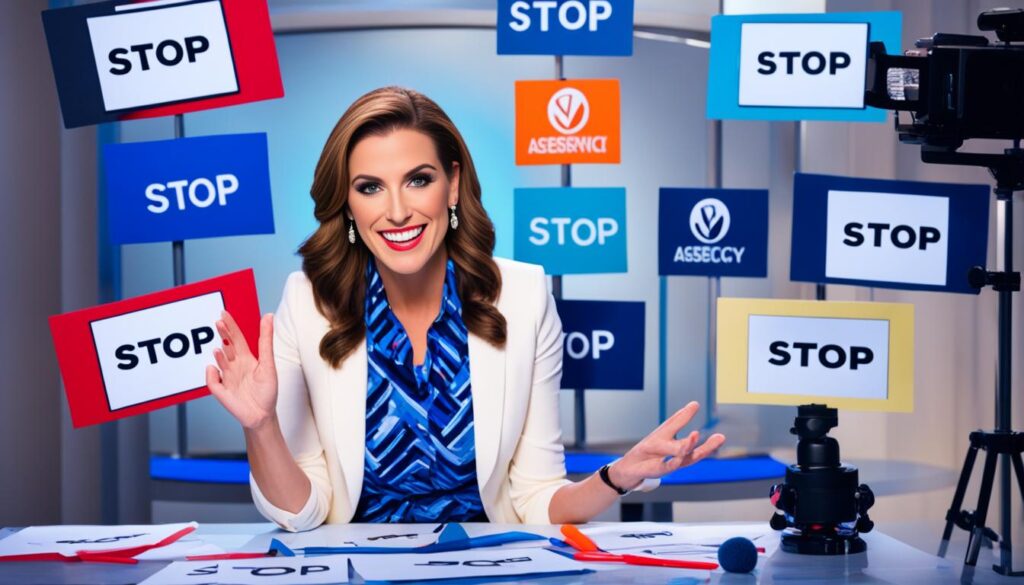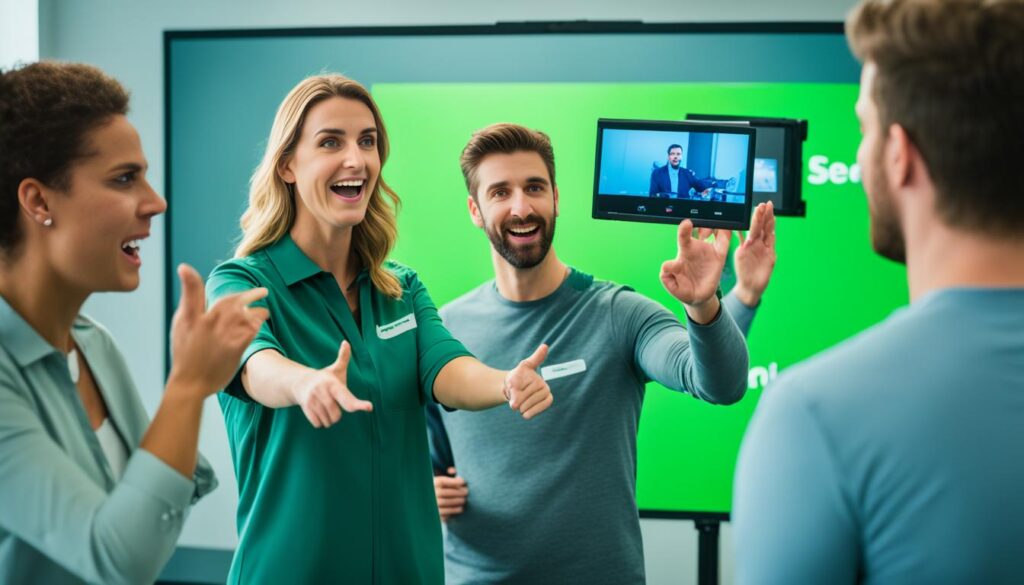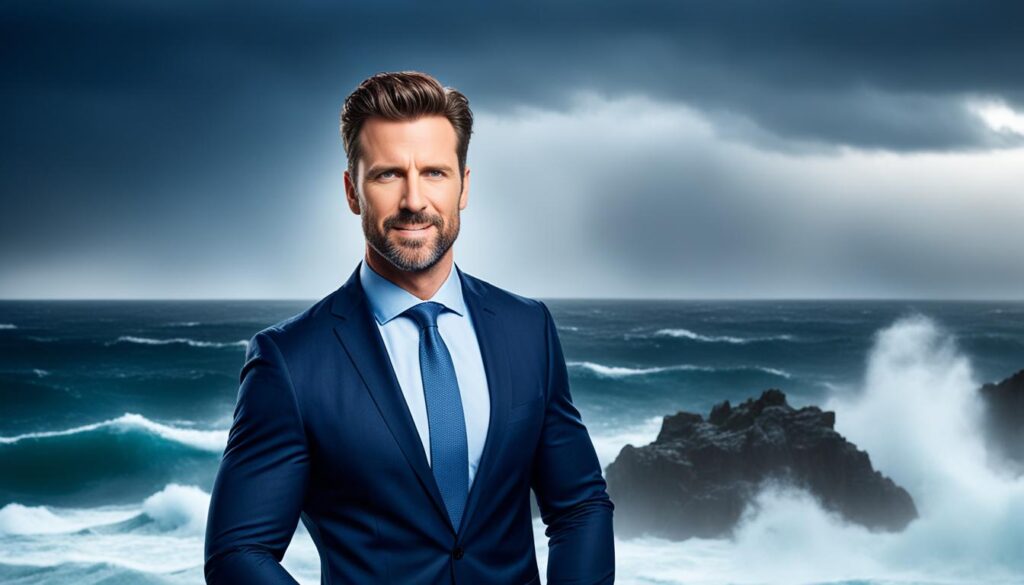Ever wondered what makes some TV spokespeople so captivating? What makes them shine and hold our attention on screen?
To be a successful TV spokesperson, knowing certain skills is key. You need to master public speaking and create a unique persona. There are techniques that can boost your presence on camera and connect you with viewers.
This article explores crucial skills and strategies for TV spokesperson success. Whether you’re starting or improving your TV skills, you’ll find valuable insights and tips here.
Are you ready to discover how to be a successful TV spokesperson? Let’s get started!

Key Takeaways:
- Mastering public speaking is vital for TV spokesperson success.
- Crafting a unique persona and genuine image helps connect with the audience.
- Strong communication and engagement skills make your message stick.
- Good personal appearance and grooming boost your credibility.
- Knowing the latest in your industry and current events is crucial.
Essential Skills for a TV Spokesperson
Being a TV spokesperson means you must speak well in public. It’s key to connect with your audience. To get better at this, think about training for TV hosts.
Media training helps TV hosts feel sure of themselves on TV. It teaches you how to share your message clearly. You learn to improve how you speak, your body language, and how you come across on camera.
Knowing how to act on camera can really make you stand out. Viewers pay attention to what you say and how you say it. They notice your moves, the look on your face, and how you act.
Here are some on-camera presence methods TV spokespeople should learn:
- Eye contact: Keep your eyes fixed on the camera to connect with those watching.
- Body language: Think about how you stand and move. You want to look confident and friendly.
- Voice modulation: Change your tone and how fast you speak to keep it interesting.
- Energy and enthusiasm: Show your excitement. It draws people in and shows you care.
- Authenticity: Just be you. Letting your real self show helps viewers relate to you.
By working on your speaking skills with media training and learning about being on camera, you can talk to and connect with the audience well.
Testimonial
“Media training changed how I act and talk on camera. I’m now more confident and can really connect with those watching. I suggest it for anyone wanting to be a TV spokesperson.” – Amy Smith, TV Host
Developing Your Persona as a TV Spokesperson
Want to be a memorable TV spokesperson? It’s about more than just sharing info. You need a unique persona that audiences love. Work on your TV hosting skills and build your TV personality.
Honing Your Television Hosting Skills
If you’re on TV, how you share information is key. Good interviewing, talk show hosting, or news presenting skills are vital. Improve these skills to grab viewers’ attention.
Focus on these important areas:
- Mastering your delivery: Work on your diction, pacing, and modulation to ensure clear and engaging communication.
- Developing interview techniques: Learn how to ask compelling questions and engage in meaningful conversations with guests.
- Refining your improvisation skills: Television hosting often requires thinking on your feet and responding to unexpected moments. Practice being quick-witted and adaptable.
Television Personality Development
Having great technical skills is important. But, having a unique TV personality is just as crucial. Viewers love authentic, relatable, and memorable personalities. This helps you stand out and build a strong on-screen brand.
“Your personality is what sets you apart from other TV spokespersons. Embrace your authentic self and let it shine through.” – Samantha Davis, Television Personality
Want to develop your TV personality? Here are some tips:
- Discover your strengths and showcase them: Identify your unique qualities and find ways to highlight them in your on-screen persona.
- Practice self-reflection: Regularly evaluate your on-screen presence and identify areas for improvement. Seek feedback from trusted colleagues or mentors.
- Be versatile: Experiment with different styles and approaches to find what resonates with your audience. Adapt your personality to different show formats and topics.
By improving your TV hosting skills and developing your personality, you can have a great career as a TV spokesperson.

Effective Communication for TV Spokespersons
TV spokespersons need great communication skills to truly connect with their viewers. This is key whether you’re hosting a show, updating news, or in ads. With strong skills, you can stand out. Let’s look at some techniques to better communicate and captivate on screen.
1. Utilize Effective Presentation Techniques
On TV, using good presentation techniques is vital. This includes visual aids like charts or pictures to help tell your story. Adding stories can also draw your audience in. Together, visuals and stories make your message unforgettable.
2. Adapt Your Communication Style to Different Platforms
Different platforms need different styles. This includes live interviews, prerecorded clips, or social media. For live spots, be smooth and confident. With prerecordeds, use editing to clear up your message. On social media, be quick and captivating to stand out.
3. Engage with Your Audience
Connecting with viewers is crucial. Include their feedback and answer their questions in your broadcasts. Make your content relatable and personal. Use social media, polls, or live calls to interact and build a community.
Engaging with your audience fosters a sense of connection and establishes trust, transforming passive viewers into active and dedicated fans.
This connection makes your viewers loyal and eager. They’ll keep watching your shows.
Mastering these skills helps you shine as a TV spokesperson. Keep improving and stay updated with trends. This way, you’ll impact your viewers and be a leading figure in TV.

| Effective Communication for TV Spokespersons | Key Points |
|---|---|
| Utilize Effective Presentation Techniques | Captivate the audience with visuals and storytelling |
| Adapt Communication Style to Different Platforms | Maintain confidence and clarity in live interviews, utilize editing capabilities in prerecorded segments, and be concise on social media. |
| Engage with the Audience | Incorporate viewer feedback, tailor content, and encourage interaction to foster a sense of community. |
Media Appearance and Image
Your look on TV matters a lot for your success. When on screen, you must look professional and appealing. This means choosing the right clothes and making sure you’re well-groomed for TV.
Having a good TV image is not just about dressing up. It’s about showing who you are through your style. You need to wear clothes that reflect your personality. And they should fit the show’s style too. Dressing right shows respect for your audience and makes you more believable.
When picking what to wear, think about colors and designs that look good on you and the set. Stay away from busy patterns that can distract. It’s best to choose simple, classic styles that always look good.
Looking good on TV isn’t just about clothes. You also need to style your hair nicely and do your makeup well. Men should keep any facial hair neat.

“How you look on TV affects how people see you and your ideas. Spend time on your look. It greatly influences your success on TV.”
It’s important to look sharp but not let it take over your message. Practice in front of a camera and get advice from experts if necessary. Caring about your TV look helps make a great and lasting impression. This way, you become a TV spokesperson people trust and respect.
Knowledge of the Industry and Current Events
As a TV spokesperson, it’s crucial to stay informed about the industry. By keeping up with the latest trends and news, you become a reliable source for insightful commentary.
Understanding the industry lets you join important discussions. This way, you can tailor your messages to address current issues effectively.
One good strategy is to regularly read industry publications and follow news sites. Subscribing to newsletters also helps you stay on top of expert opinions and breaking news.
“Staying informed about the industry helps you understand the bigger picture and make informed decisions.”
Attending industry events like conferences and seminars is beneficial. These gatherings are great for learning from leaders and making professional connections.
Importance of Keeping Up with Current Events
For a TV spokesperson, being up-to-date with current events is key. This allows you to offer your audience relevant insights.
Current events shape opinions and trends. By being informed, you can tackle these topics in your commentary.
Moreover, knowledge of current events boosts your credibility. It can open up more media opportunities and strengthen your brand.
Strategies for Staying Informed
To keep informed, try these strategies:
- Set up Google Alerts for industry keywords to get updates.
- Follow thought leaders on Twitter and LinkedIn.
- Join online communities to discuss and share insights.
- Expand your knowledge by listening to podcasts or watching webinars.
Remember, staying informed takes effort and dedication. By investing in continuous learning, you’ll become a more effective TV spokesperson.

Flexibility and Adaptability
Having flexibility and adaptability is key for any successful TV spokesperson. The TV world changes fast. You need to adapt to different styles and unexpected events, thinking quickly.
Being able to change and respond fast makes some speakers stand out. They are the ones who do exceptionally well.
“Being adaptable means not being afraid to step out of your comfort zone. As a TV spokesperson, you need to be versatile and ready to embrace new challenges.”
It’s important for TV spokespersons to adjust to various formats. This could be live interviews, panel talks, or recorded parts. You must smoothly change between them and share your message well.
Unexpected situations are also part of the job for a TV spokesperson. Tech problems or last-minute changes? You need to stay cool and find fast, creative fixes to keep going.
Quick thinking is essential for any TV spokesperson. You might face surprising questions or tough topics. Staying alert lets you give smart and quick answers. This makes you confident and engaging on the air.
A Table of Different Formats
| Format | Description |
|---|---|
| Live interview | A real-time conversation with a host or journalist, often broadcasted or streamed live. |
| Panel discussion | A group conversation or debate with multiple participants sharing their perspectives on a specific topic. |
| Pre-recorded segment | A segment that is recorded in advance and later edited for broadcast or streaming. |
| Remote interview | An interview conducted remotely, using video conferencing or other digital communication platforms. |
To be adaptable and manage surprises, practice is key. Try mock interviews, go to rehearsals, and ask professionals for feedback. This will sharpen your skills. Keep improving to be a great TV spokesperson.
Networking and Building Relationships
For TV spokespersons, building connections is key. Networking with others, attending events, and making friends opens doors to new chances. These steps can lead to exciting partnerships and opportunities.
When you connect with others in TV, you gain helpful insights and support. Knowing the latest trends keeps you on top of your game. Having industry friends is crucial in the ever-changing TV world.
“Networking is not about just connecting people. It’s about connecting people with people, people with ideas, and people with opportunities.”
– Michele Jennae, TV Host and Media Coach
Going to industry events lets you meet a wide range of experts. These places are perfect for meeting new people and growing your network. To make the most of it, talk to others, exchange details, and keep in touch.
Real relationships go beyond swapping business cards. They’re about showing you care and supporting each other. By doing this, you help both your career and others’ success.
“Networking is not collecting contacts; networking is about planting relationships.”
– Mihaela Dianu, TV Presenter and Communication Expert
Working with other spokespersons or industry folks is great. It lets you learn, share knowledge, and get your message further. These partnerships are win-win, helping you grow your reach.
Importance of Networking and Relationship Building
The benefits of networking for TV spokespersons are many:
- Access to insider information and industry insights
- Opportunities for career advancement and personal growth
- Potential collaborations and partnerships
- Increased visibility and exposure within the industry
- Support and mentorship from experienced professionals
“Your network is your net worth.”
– Porter Gale, Author of ‘Your Network Is Your Net Worth’
Building a strong network takes time and dedication. It’s about being active, following up, and helping others succeed. Investing in networking sets a strong base for your TV career.

Continuous Learning and Professional Development
For TV spokespersons looking to be at the top, continuous learning is key. It helps you excel in your career and outshine in a competitive field. By seeking training and keeping up with trends, you improve your skills and on-camera performance.
Professional training sharpens your public speaking and communication techniques. It helps you connect well with your audience. Workshops on media and improving on-camera presence are especially helpful. They offer insights and practical advice to boost your confidence and abilities.
It’s also vital to stay informed about industry trends and new developments. This knowledge helps you adapt your style to meet new challenges. It makes you a trusted and informed TV spokesperson. You become more relevant and valuable to your audience.
To further your learning journey, join professional groups, go to conferences, and try webinars or online courses. Interacting with peers and experts expands your understanding. It also opens up new perspectives and opportunities for making valuable connections.
Benefits of Continuous Learning and Professional Development:
- Enhanced public speaking skills and on-camera presence
- Improved communication techniques and audience engagement
- Knowledge of industry trends and the ability to provide insightful commentary
- Adaptability to changing media landscapes and emerging challenges
- Expanded professional network and opportunities for collaboration
As a TV spokesperson, remember that your development is a continuous journey. It takes dedication and commitment. Embrace this path of learning and professional growth. It will help you stand out and share powerful messages with your viewers.
| Professional Training Opportunities | Stay Updated with Industry Trends |
|---|---|
|
|

Confidence and Resilience
Building confidence and resilience is key for success as a TV spokesperson. Being the face of a brand demands self-assurance. You must handle tough situations gracefully.
TV spokespersons often battle stage fright. The stress of facing cameras and large crowds can be heavy. But, with good strategies, overcoming this fear is possible. This leads to powerful performances.
Building confidence: For confidence, being well-prepared is crucial. Know your material, practice speaking, and imagine doing well. Also, training with a media expert or attending speaking workshops can boost your self-belief.
Developing resilience: TV spokespersons will face criticism and setbacks. It’s vital to recover quickly from these. See feedback as a chance to grow. Challenges are opportunities to strengthen yourself.
“Resilience is not about avoiding negativity but learning how to bounce back from it.” – Barack Obama
H3: Bouncing back from setbacks
Resilience means learning from every challenge you meet. Every problem you face can teach you. This makes you more ready for what comes next.
H3: Self-care and support
It’s important to look after your mental and emotional health. Focus on self-care like exercise and mindfulness. Getting support from loved ones or a therapist is strong, not weak.

| Building Confidence | Developing Resilience |
|---|---|
| 1. Prepare thoroughly | 1. Embrace challenges as opportunities for growth |
| 2. Seek guidance and training | 2. Learn from setbacks and mistakes |
| 3. Practice visualization and positive affirmations | 3. Prioritize self-care and support |
| 4. View mistakes as learning experiences | 4. Develop a growth mindset |
In conclusion, to be a successful TV spokesperson, confidence and resilience are necessary. By dealing with stage fright, managing criticism, and growing resilience, you can handle the job’s challenges and excel in your TV career.
Personal Branding and Marketing
If you want to be a TV spokesperson, personal branding and marketing are vital. You need to define and present your unique brand. This way, you can become a key voice in the field.
Having a strong online presence is important. Use platforms like Instagram, Twitter, and LinkedIn to show off your talents and knowledge. Talk to your audience and share useful tips. Also, connect with other experts in your field.
To market yourself well, you need a good plan. Write an engaging bio and mention your big wins. This draws in possible employers and partners. Working with well-known brands and influencers can also boost your credibility.
Being consistent with your personal branding is crucial. Make sure your online persona, website, and social profiles match up well. This proactive approach in marketing yourself will help you become a favored TV spokesperson. It opens up great opportunities for you.